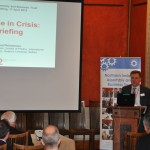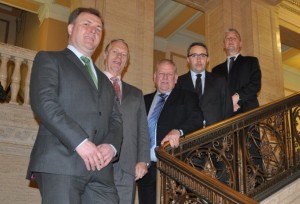 Professor David Phinnemore, Professor of European Politics at the Queens University Belfast was on hand on Tuesday 17 April 2012 to brief members on the recent crisis in the Eurozone.
Professor David Phinnemore, Professor of European Politics at the Queens University Belfast was on hand on Tuesday 17 April 2012 to brief members on the recent crisis in the Eurozone.
The talk focused on some of the key stages on the EU timeline, leading up to the spiralling crisis of December 2009 when Greece signalled debts of €110bn.
The briefing looked closely at how the European Union responded to the Greece debt crisis and the subsequent bailouts required for Ireland and Portugal.
 The introduction of the €440bn European Financial Stability Facility (ESFS in May 2010 and the agreement by the European Council to establish a permanent European Stability Mechanism in October 2010 were important initial steps in a bid to safeguard the financial stability of the euro area as a whole.
The introduction of the €440bn European Financial Stability Facility (ESFS in May 2010 and the agreement by the European Council to establish a permanent European Stability Mechanism in October 2010 were important initial steps in a bid to safeguard the financial stability of the euro area as a whole.
There were a number of thought provoking questions from members. They were keen to discover what influence national politics would have on how the crisis is resolved and whether or not economies such as Ireland and Portugal could develop fast enough to actually repay the debt owed. Members were also interested to learn if more and more differentiation of membership could eventually lead to a fragmentation of the union.
 There were of course no easy answers but Professor Phinnemore was keen to point out that a more positive outlook could be on the horizon. He cited the July 2011 Treaty establishing a permanent European Stability Mechanism (ESM) and the adoption in October 2011of the ‘six pack’ of legislative measures on improved economic governance as concrete methods to stabilize the union.
There were of course no easy answers but Professor Phinnemore was keen to point out that a more positive outlook could be on the horizon. He cited the July 2011 Treaty establishing a permanent European Stability Mechanism (ESM) and the adoption in October 2011of the ‘six pack’ of legislative measures on improved economic governance as concrete methods to stabilize the union.
